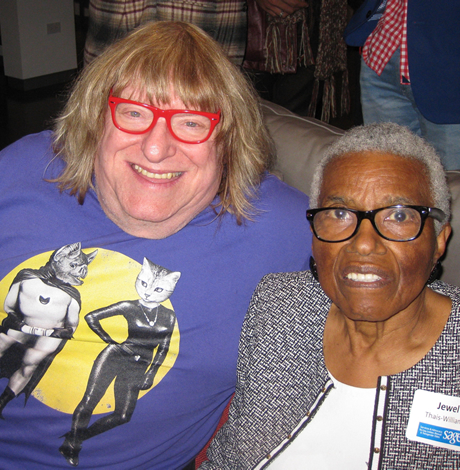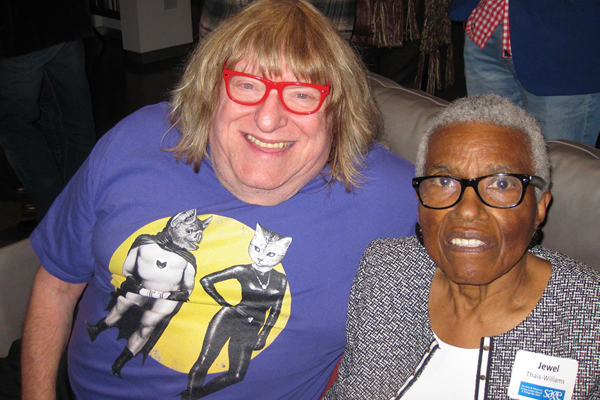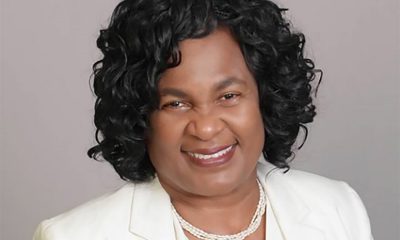Arts & Entertainment
SAGE honors Vilanch, Jewel Thais-Williams in L.A.
‘We did the bravest thing — we came out’


Honorees Bruce Vilanch and Jewel Thais-Williams
LOS ANGELES — The fundraiser for SAGE USA March 4 in the Hollywood Hills felt like a reunion, a coming together of a generation of LGBT people with shared memories and a desire to confront aging, an issue, SAGE Board Development chair Bill Weinberger said, he heretofore had avoided thinking about. Honorees Jewel Thais-Williams and Bruce Vilanch, however, exemplify how LGBT people can age as respected elders with grace, continued activism, and humor.
Weinberger introduced Phill Wilson, founder of the Black AIDS Institute, whom he has known since the early 1980s. Shortly after, Wilson discovered he was HIV positive. He noted that while “many of us were dealing with whether we would survive or not, SAGE has always believed we would.” Wilson shared how Thais-Williams bravely opened Jewel’s Catch One Disco as a refuge for LGBT people desperate for a place where they could be themselves.
“Jewel has been a leader, a hero, and a visionary and an advocate for a long, long time,” Wilson said. “Jewel was one of those ‘bridge’ people,” linking the LGBT African-American community to organizations such as AIDS Project Los Angeles and her alma mater, UCLA. You always speak up, whether you’re afraid or not.”
Thais-Williams joked that she was honored to be honored, having spent the last 42 years at Catch One “partying,” adding that she will turn 78 in a couple of months. “To be of service to my community has been a great joy,” she said. “But there is still a lot of work to do. Remember to always reach out to those in need.”
“There has never been a more important time to come together,” SAGE CEO Michael Adams told the diverse crowd of SAGE board members, staffers and supporters at the elegant home of James Frost and William Yi. “We are living in very challenging times,” a notion received with a knowing chuckle for its understatement.
A civilization is historically measured by how it cares and supports its children and most vulnerable and how it supports its elders, Adams said, not just the “right kind of elders….We owe it to our elders, the pioneers who paved the way for the equality we celebrate today….We need the wisdom of our pioneers, our elders.”
SAGE (Services and Advocacy for GLBT Elders) was founded in 1978 in Greenwich Village by two activists and a handful of supporters to provide a visiting program and drop-in center for LGBT seniors. It is now a national organization with 30 SAGENet affiliates in 20 states and D.C., and is partnering with the Williams Institute at UCLA School of Law. Adams also had kind words for the LA LGBT Center and its programs caring for LGBT seniors.
Demographic estimates predict that there will be 6 million LGBT people age 65 years or over in America by 2030. That sets the stage for a potentially disastrous future since, as SAGE notes, LGBT seniors are “twice as likely to be single, twice as likely to live alone, and four times more likely to be without children than their heterosexual peers.” And, Adam said, facilities that take care of the aging population are “woefully unprepared” to take care of LGBT seniors who fear having to go back in the closet in order to get care and treatment without discrimination.
In introducing comedic writer/actor Bruce Vilanch, SAGE Board co-chair Elizabeth Schwartz—whose co-chair is former LA-based board activist Kevin Williams—said Vilanch’s appearances on “Hollywood Squares” were “instrumental in shaping gay images.” Watching him, “we didn’t have to speculate obsessively” about whether he was gay “as I did over Kristy McNichol.” She was also grateful that he was also out about being chubby. Vilanch, she said, has a “tireless dedication to the LGBT community.”
In accepting the handsomely shaped glass award, the legendary Oscar writer said that when he was told he was being honored by SAGE, his first thought was: “You have the wrong envelope,” referring to the Best Picture mishap at the Academy Awards.
However, a recent interview with a young journalist underscored that he is now arcing “into my dotage.” The young gay man had no idea who Ted Mack was, though “Ted Mack’s Amateur Hour,” the variety-show precursor to shows like “American Idol,” launched the careers of such future celebrities as Pat Boone and Ann-Margret. The young man sat stone faced at the mention of her name.
“When queens don’t know who Ann-Margret is, we’re in trouble,” Vilanch said to an uproar of laughter.
“Senior gays are not venerated,” he said. “But we are valued because we can pick up the check or write it.”
As to his decision to be openly gay at a time when being out was a brave decision, Vilanch noted that he worked in the more accepting entertainment industry. But early on, he worked as a journalist writing features for the Chicago Tribune and tried to get gay stories into the paper. Vilanch cited a quote that stuck with him: “A faggot is a homosexual gentleman who just left the room.” He determined to be “the faggot who stayed in the room.”
LGBT progress is result of taking action. “We did the bravest thing—we came out and that changed everything,” Vilanch said. But the LGBT community cannot rely on help from outside. “We have to do it for ourselves….[and] we’re not done yet.”
SAGE CEO Michael Adams also announced the launch of a new initiative in conjunction with AARP—SAGETable— to build “intergenerational connections in the LGBT community” by “breaking bread with your LGBT family on May 18. Visit sagetable.org.
a&e features
Eastern Shore chef named James Beard Finalist
Harley Peet creates inventive food in an inclusive space

In a small Eastern Shore town filled with boutiques, galleries, and the occasional cry of waterfowl from the Chesapeake, Chef Harley Peet is most at home. In his Viennese-inflected, Maryland-sourced fine-dining destination Bas Rouge, Peet draws from his Northern Michigan upbringing, Culinary Institute of America education, and identity as a gay man, for inspiration.
And recently, Peet was named a James Beard Finalist for Best Chef: Mid-Atlantic – the first “Best Chef: Mid-Atlantic” finalist representing the Eastern Shore.
Peet, after graduation from the Culinary Institute of America, took a position as sous chef at Tilghman Island Inn, not far from Bas Rouge. Falling in love with the Eastern Shore, he continued his passion for racing sailboats, boating, gardening, and fishing, and living his somewhat pastoral life as he opened Bas Rouge in 2016 as head chef, a restaurant part of the Bluepoint Hospitality group, which runs more than a dozen concepts in and around Easton, Md.
Coming from a rural area and being gay, Peet knew he had his work cut out for him. He was always aware that the service and hospitality industry “can be down and dirty and rough.”
Now as a leader in the kitchen, he aims to “set a good example, and treat people how I want to be treated. I also want to make sure if you’re at our establishment, I’m the first to stand up and say something.”
The Bas Rouge cuisine, he says, is Contemporary European. “I’m inspired by old-world techniques of countries like Austria, Germany, and France, but I love putting a new spin on classic dishes and finding innovative ways to incorporate the bounty of local Chesapeake ingredients.”
His proudest dish: the humble-yet-elevated Wiener Schnitzel. “It is authentic to what one would expect to find in Vienna, down to the Lingonberries.” From his in-house bakery, Peet dries and grinds the housemade Kaiser-Semmel bread to use as the breadcrumbs.
Peet works to support the LGBTQ community inside and outside of the kitchen. “I love that our Bluepoint Hospitality team has created welcoming spaces where our patrons feel comfortable dining at each of our establishments. Our staff have a genuine respect for one another and work together free of judgment.”
Representing Bluepoint, Peet has participated in events like Chefs for Equality with the Human Rights Campaign, advocating for LGBTQ rights.
At Bas Rouge, Peet brings together his passion for inclusion steeped in a sustainability ethic. He sees environmental stewardship as a way of life. Peet and his husband have lived and worked on their own organic farm for several years. Through research in Europe, he learned about international marine sourcing. Witnessing the impacts of overfishing, Peet considers his own role in promoting eco-friendly practices at Bas Rouge. To that end, he ensures responsible sourcing commitments through his purveyors, relationships that have helped create significant change in how people dine in Easton.
“I have built great relationships in the community and there’s nothing better than one of our long-standing purveyors stopping in with a cooler of fresh fish from the Chesapeake Bay. This goes especially for catching and plating the invasive blue catfish species, which helps control the species’ threat to the local ecosystem.
Through his kitchen exploits, Peet expressed a unique connection to another gay icon in a rural fine-dining restaurant: Patrick O’Connell, of three Michelin starred Inn at Little Washington. In fact, Peet’s husband helped design some of O’Connell’s kitchen spaces. They’ve both been able to navigate treacherous restaurant-industry waters, and have come out triumphant and celebrated. Of O’Connell, Peet says that he “sees [his restaurants] as canvas, all artistry, he sees this as every night is a show.” But at the same time, his “judgment-free space makes him a role model.”
Being in Easton itself is not without challenges. Sourcing is a challenge, having to either fly or ship in ingredients, whereas urban restaurants have the benefit of trucking, he says. The small town “is romantic and charming,” but logistics are difficult – one of the reasons that Peet ensures his team is diverse, building in different viewpoints, and also “making things a hell of a lot more fun.”
Reflecting on challenges and finding (and creating) space on the Eastern Shore, Peet confirmed how important it was to surround himself with people who set a good example, and “if you don’t like the way something is going … move on.”

Team DC, the umbrella organization for LGBTQ-friendly sports teams and leagues in the D.C. area, held its annual Night of Champions Awards Gala on Saturday, April 20 at the Hilton National Mall. The organization gave out scholarships to area LGBTQ student athletes as well as awards to the Different Drummers, Kelly Laczko of Duplex Diner, Stacy Smith of the Edmund Burke School, Bryan Frank of Triout, JC Adams of DCG Basketball and the DC Gay Flag Football League.
(Washington Blade photos by Michael Key)




















The 2024 National Cannabis Festival was held at the Fields at RFK Stadium on April 19-20.
(Washington Blade photos by Michael Key)
















Covering the @NatlCannaFest at RFK Stadium for @WashBlade . Stop by the LGBTQ+ booth and pick up a paper if you are here. pic.twitter.com/is7hnsaPns
— Michael Patrick Key (@MichaelKeyWB) April 20, 2024
-

 State Department2 days ago
State Department2 days agoState Department releases annual human rights report
-

 Maryland4 days ago
Maryland4 days agoJoe Vogel campaign holds ‘Big Gay Canvass Kickoff’
-

 Politics3 days ago
Politics3 days agoSmithsonian staff concerned about future of LGBTQ programming amid GOP scrutiny
-

 The White House1 day ago
The White House1 day agoWhite House debuts action plan targeting pollutants in drinking water












